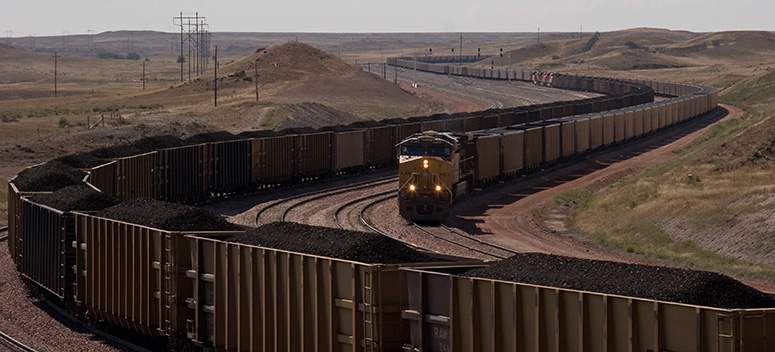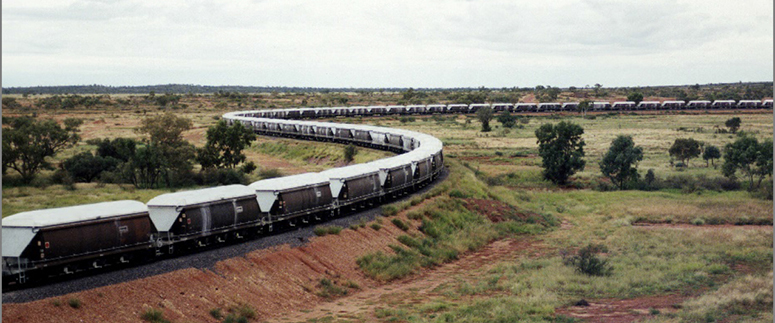Can 10 million tons of Utah coal per year be brought by train through the Bay Area and shipped from Oakland to Asia, without polluting neighborhoods and San Francisco Bay? Can such a scheme cut down on pollution in Beijing and even help reduce worldwide carbon emissions? The developers of a bulk shipping terminal in Oakland claim it can be done. Sadly, this is a lie.

Opponents of the terminal believe that open coal railcars pose threats to people and the environment. Photo by Daniel Dancer
By Sejal Choksi-Chugh
Published: April, 2016
Can 10 million tons of Utah coal per year be brought by train through the Bay Area and shipped from Oakland to Asia, without polluting neighborhoods and San Francisco Bay? Can such a scheme cut down on pollution in Beijing and even help reduce worldwide carbon emissions? The developers of a bulk shipping terminal in Oakland claim it can be done. Sadly, this is a lie.
Baykeeper opposes the export of coal from Oakland, because coal would likely be shipped in open rail cars on tracks that run near the San Francisco Bay shoreline, and through cities that include Richmond, Berkeley, Emeryville, and West Oakland. All along the way, the trains would shed toxic dust and pieces of coal. Coal could also be spilled directly into the Bay while being loaded onto ships.
Coal contains arsenic, lead, mercury, chromium and other toxic heavy metals. Its effects range from asthma in kids to reproductive harm to fish.
But wait, say the developers. They claim the coal will be shipped in covered rail cars that would not pollute our neighborhoods and the Bay. But when coal gets overheated, it can explode. That’s why it has always been shipped in open cars. If the covered cars have enough ventilation to prevent explosions, coal dust and small pieces of coal will still leak out. But even more importantly, the technology to safely ship coal in covered cars across the county hasn’t been demonstrated.
The process of getting the coal from the train cars and onto ships for export also threatens the Bay with pollution. The developers claim it will all be done with “encapsulated domes” and “thoroughly enclosed conveyors.” But if the domes and conveyors are too tightly enclosed, there’s a risk of explosions—right on the Bay shoreline. If they are ventilated, toxic dust could be blown into the Bay.
Is it true, as the developers claim, that no public money is being spent on the coal export terminal? The coal export terminal is part of the redevelopment of the former Oakland Army Base. Without the $242 million investment from the California Transportation Commission, the redevelopment would not be possible. The state legislature of Utah also recently passed a bill providing $53 million in public money for the export terminal. In addition, Bowie Resources, the company whose Utah coal would be shipped to Oakland, will have control over the export terminal.
Finally, the developers claim that the Utah coal they want to bring here is cleaner, and that burning this coal will help reduce global climate change. “Clean coal” is a dirty lie. All coal contains toxic substances and generates large amounts of the gases that cause global climate change. The trains that bring the coal to the Bay Area would also burn fuel that produces pollution and gases that contribute to climate change, and so would the ships that take it away. There is no basis for the claim that shipping Utah coal halfway around the world to “India, China and the Far East” will be less polluting than using “locally available coal.”
Baykeeper, the Sierra Club and many other environmental and community organizations are urging Oakland city leaders to prevent the export of coal from Oakland. We also support legislation introduced by State Senator Loni Hancock, SB 1277-1280, to restrict the export of coal from California.
As Governor Jerry Brown stated last summer, in order to avoid the worst effects of global climate change, “over 90 percent” of the world’s known coal “can never be taken out of the ground.” If California is serious about its commitment to reducing greenhouse gas pollution, the only thing we should be exporting from Oakland is our clean energy technology.
Sejal Choksi-Chugh is the Executive Director of San Francisco Baykeeper. Baykeeper uses on-the-water patrols of San Francisco Bay, science, advocacy and the courts to stop Bay pollution. To report pollution, call Baykeeper’s hotline at 1-800-KEEP-BAY, e-mail hotline@baykeeper.org, or click “Report Pollution” at baykeeper.org.

Kimon Berlin, Flickr (CC)


